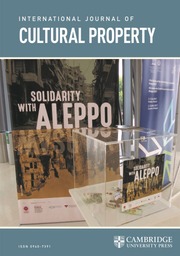Article contents
International Cultural Heritage Regimes, International Law, and the Politics of Expertise
Published online by Cambridge University Press: 05 March 2014
Abstract:
The article examines the problematic politics of expertise in the formation of international legal rules in the field of heritage, looking specifically at international conventions made under the auspices of UNESCO. The article shows that, even within this seemingly small and cohesive universe, there is a lot of room for disagreement, and much of it can be traced back to what Laurajane Smith has called “the Authorized Heritage Discourse” (AHD). The AHD is responsible for the dichotomization of heritage between intangible and tangible, as heritage professionals strive to hold on to and expand their self-created professional legitimacy and importance. Heritage professionals, in striving to maintain their relevance, tend to create self-referential regimes that exclude heritage holders and communities. I argue that lawyers, because of their own professional tendencies, might be in a position to offer a counterpoint to rule by experts in international cultural heritage management.
- Type
- Research Article
- Information
- Copyright
- Copyright © International Cultural Property Society 2013
References
- 12
- Cited by




